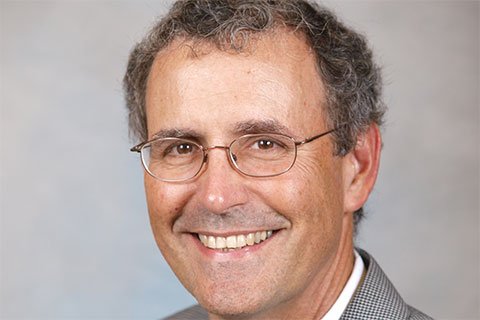Gladfelter receives Taylor Award of Distinguished Service

Throughout his 36-year career, Professor Wayne Gladfelter has assembled a remarkable record of service to the Department of Chemistry, the College of Science & Engineering (CSE), the University of Minnesota, and to the discipline of chemistry beyond the university. In recognition of his service to others, he has been awarded the 2015 George W. Taylor Award of Distinguished Service by the College of Science and Engineering. This award recognizes outstanding service to the University of Minnesota and voluntary public service.
At all levels, Gladfelter is lauded for his commitment to providing excellent leadership, his willingness to accept challenging assignments, and his acumen as a creative problem-solver.
“Professor Gladfelter has devoted himself to service to the University in many ways, always with a calm demeanor and generosity of spirit,” said Professor William Tolman, chair of the Department of Chemistry.
Since joining the Department of Chemistry faculty in 1979, Gladfelter’s service record in the department has been extensive. Early in his career, he served for five years on the Graduate Committee, responsible for recruiting new students and overseeing student progress. He also served a three-year term as Director of Graduate Studies. He has lead or served on a number of department committees, including tenure and promotions committees, and faculty search committees.
In 1999, Gladfelter was appointed chair of the Department of Chemistry, a position he held for six years. During his tenure, he oversaw the planning, design, and fund-raising effort for the department’s LeClaire-Dow Instrumentation Facility, which houses the nuclear magnetic resonance, mass spectrometry, and X- ray crystallographic laboratories. He also led the department through a centennial celebration, and through transitions taking place at the college and university levels.
Shortly after stepping down as department chair, Gladfelter was asked to serve as the college’s Associate Dean of Academic Affairs. He worked with other college leaders to navigate a number of changes, opportunities, and challenges, including a name change for the college, the transformation of the Graduate School, an expansion of undergraduate enrollment, increases in the number of faculty, and expansion of graduate programs. A tough challenge encompassed working through revisions to criteria for tenure and promotion. He led the college’s expanded efforts on diversity initiatives, including salary equity reviews and the recruitment of a diverse faculty. As a tireless advocate for female faculty, he provided programming and resources to allow women to meet and discuss issues that were important for advancement, work-life balance, and success.
Last year, Gladfelter accepted the responsibility of leading the University’s MnDRIVE hiring initiative on Robotics, Sensors, and Advanced Manufacturing, which included recruiting and hiring new faculty members. Under his leadership, six new faculty members were hired in four departments and two colleges.
“Wayne’s acceptance of this responsibility was clearly well beyond the call of duty—this initiative is not in his area of specialty, and his home department was not recruiting under MnDRIVE,” said Mos Kaveh, CSE Associate Dean for Research and Planning.
In addition to the Department of Chemistry’s instrumentation facility, Gladfelter has been extensively involved in the university’s Characterization Facility, including serving as administrator and as chair and member of its executive committee. In 1992, he was the principal investigator on a successful National Science Foundation (NSF)-proposal to purchase a new Rutherford backscattering spectrometer. This year, he organized a NSF magnetic resonance imaging request to purchase a new $1.2 million surface analysis system for the facility.
Gladfelter has also been extremely active in promoting chemistry to the broader scientific community, including through the American Chemical Society (ACS), the Materials Research Society, the Council for Chemical Research, and the American Association for the Advancement of Science (AAAS). He served as chair of the AAAS chemistry section, and was treasurer of the ACS Division of Inorganic Chemistry. His contributions include serving in leadership roles and organizing symposia for the ACS, NSF, and Materials Research Society. He serves on the advisory boards for many scientific journals, including Inorganic Chemistry, Journal of Coordination Chemistry, Ceramics International, and Chemical Vapor Deposition. He has been honored as a Fellow of the AAAS.
In addition, Gladfelter has a distinguished record of research and teaching. He has graduated more than 50 doctorate students and, with them, has co-authored more than 250 papers. Gladfelter has also mentored 15 post-doctoral associates, and advised 65 undergraduate researchers. He is one of the college’s Distinguished Professors who are honored for their contributions to teaching and scholarly research, and commitment to the college.
Gladfelter’s early research focused on metal cluster chemistry and included discoveries of anion- promoted homogeneous catalytic reactions. His work included a series of elegant studies of the mechanism of the catalytic carbonylation of nitroaromatics, which is an environmentally friendlier approach to aromatic isocyanates. He also made important contributions to the field of materials C=chemistry where he has focused on the use of organometallic compounds to prepare nanoparticles and thin films for microelectronic and photovoltaic applications.
“He is a creative problem-solver . . . ,” wrote Professor Arlene Early Carney who worked closely with Gladfelter in her role as Vice Provost for Faculty and Academic Affairs. “Wayne is unfailingly honest and straightforward . . . He is absolutely dedicated to his department and to the CSE, and will continue this level of service throughout his career.”
The George W. Taylor Award was established in 1982. In addition to Gladfelter, other chemistry professors who have received this award include Paul Barbara, Christopher Cramer, Paul Gassman, Louis Pignolet, and Donald Truhlar.
